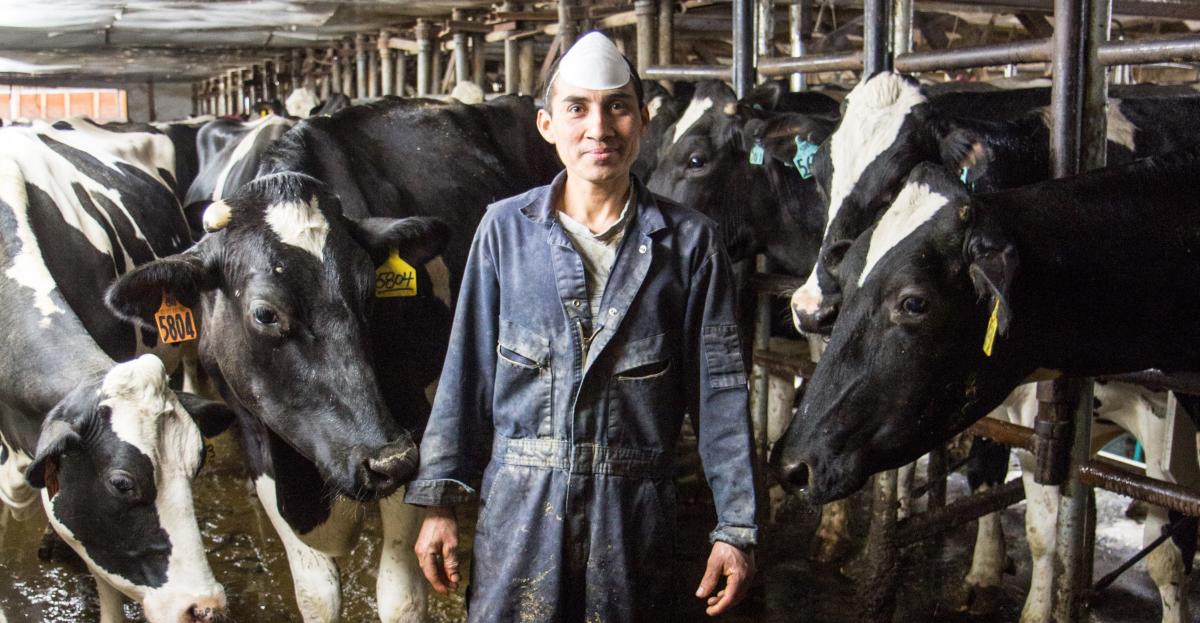The Milk with Dignity Code of Conduct

The Milk with Dignity Code of Conduct was designed by farmworkers and will continue to be shaped over time through detailed dialogue among farmworkers and farmers. As the MD Program matures and evolves, so too will the Code, as it continues to serve as the primary platform upon which to build a truly sustainable dairy industry. The summary below includes some examples of the broad principles in the Code’s provisions for working and housing conditions.
Examples of Major Tenets of the Milk with Dignity Code of Conduct
-
Participating Farms are required to abide by all applicable laws, codes and regulations, including this Code, regarding wages and benefits, working hours, equal opportunity, and employee safety and health. The Code expressly requires compliance with several laws that otherwise currently exclude farmworkers.
-
There is zero tolerance for forced labor, systemic unlawful child labor, the threat or use of sexual or physical assault, or retaliation against workers for advocating for changes or participating in the MD Program;
-
Participating Farms will not discharge or discipline workers except for just cause and in accordance with progressive disciplinary measures.
Dignified Wages: All Participating Farms define time-bound plans to pay all qualifying workers at least the prevailing minimum wage (regardless of whether agricultural workers are excluded from the applicable state minimum wage). A bonus will be passed-through to workers on each paycheck, drawing upon the premium paid to farmers by Buyers. Workers must be paid no less than twice monthly with standard paystub.
Dignified Schedules: including time for rest and leisure. Participating Farms will develop and implement plans and procedures to ensure that workers have sufficient breaks during the day, including adequate time for meals and sleep each day. Workers will have the right, to at least one 24-hour period of consecutive rest each week. Workers will be provided 5 paid vacation days. Workers will be provided reasonable accommodations in order to take care of their basic human needs, such as purchasing groceries, accessing health care, or worship.
Dignified Housing: if housing is provided by a Participating Farm, it must be voluntary and comply with all laws, and the cost for housing to the workers cannot reduce workers’ net wages below the prevailing minimum wage. Workers are recognized as and afforded the rights of tenants.
Healthy, Safe and Secure Workplaces: including, for example, access to workers’ compensation; five paid sick days per year; protective equipment, and trainings about health hazards, risks, and safety procedures in a language that workers can fully comprehend.
Cooperation and Transparency: Participating Farms will pass through to their qualifying employees the appropriate premium payments received under the Program.
Remedying Violations: Participating Farms work with the MDSC to develop a mutually agreeable corrective action plan that addresses any problems that are substantiated in the course of an audit or via the complaint mechanism. Participating Farms address every Code violation on a timeline that takes into account the farms’ resources. A farm’s repeated refusal to comply, or engagement in zero tolerance violations can result in suspension from the MD Program. The farm would cease to receive the MD Premium funds during the time of suspension.
